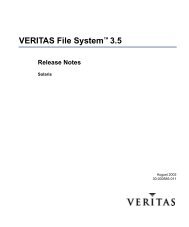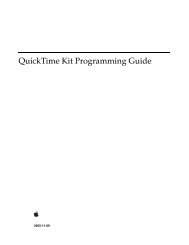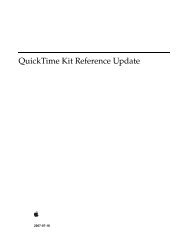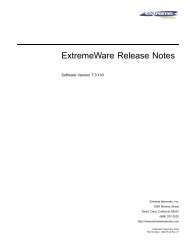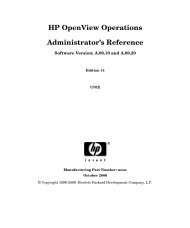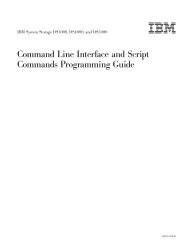HP-UX VxFS tuning and performance - filibeto.org
HP-UX VxFS tuning and performance - filibeto.org
HP-UX VxFS tuning and performance - filibeto.org
Create successful ePaper yourself
Turn your PDF publications into a flip-book with our unique Google optimized e-Paper software.
30<br />
<strong>VxFS</strong> ioctl() options<br />
Cache advisories<br />
While the mount options allow you to change the cache advisories on a per-file system basis, the<br />
VX_SETCACHE ioctl() allows an application to change the cache advisory on a per-file basis. The<br />
following options are available with the VX_SETCACHE ioctl:<br />
VX_RANDOM - Treat read as r<strong>and</strong>om I/O <strong>and</strong> do not perform read ahead<br />
VX_SEQ - Treat read as sequential <strong>and</strong> perform maximum amount of read ahead<br />
VX_DIRECT - Bypass the buffer cache. All I/O to the file is synchronous. The application buffer must<br />
be aligned on a word (4 byte) address, <strong>and</strong> the I/O must begin on a block (1024 KB) boundary.<br />
VX_NOREUSE - Invalidate buffer immediately after use. This option is useful for data that is not<br />
likely to be reused.<br />
VX_DSYNC - Data is written synchronously, but the file‟s timestamps in the inode are not flushed to<br />
disk. This option is similar to using the O_DSYNC flag when opening the file.<br />
VX_UNBUFFERED - Same behavior as VX_DIRECT, but updating the file size in the inode is done<br />
asynchronously.<br />
VX_CONCURRENT - Enables concurrent I/O on the specified file.<br />
See the manpage vxfsio(7) for more information. <strong>HP</strong> OnLineJFS product is required to us the<br />
VX_SETCACHE ioctl().<br />
Allocation policies<br />
The VX_SETEXT ioctl() passes 3 parameters: a fixed extent size to use, the amount of space to reserve<br />
for the file, <strong>and</strong> an allocation flag defined below.<br />
VX_NOEXTEND - write will fail if an attempt is made to extend the file past the current reservation<br />
VX_TRIM - trim the reservation when the last close of the file is performed<br />
VX_CONTIGUOUS - the reservation must be allocated in a single extent<br />
VX_ALIGN - all extents must be aligned on an extent-sized boundary<br />
VX_NORESERVE - reserve space, but do not record reservation space in the inode. If the file is<br />
closed or the system fails, the reservation is lost.<br />
VX_CHGSIZE - update the file size in the inode to reflect the reservation amount. This allocation<br />
does not initialize the data <strong>and</strong> reads from the uninitialized portion of the file will return unknown<br />
contents. Root permission is required.<br />
VX_GROWFILE - update the file size in the inode to reflect the reservation amount. Subsequent<br />
reads from the uninitialized portion of the file will return zeros. This option creates Zero Fill On<br />
Dem<strong>and</strong> (ZFOD) extents. Writing to ZFOD extents negates the benefit of concurrent I/O.<br />
Reserving file space insures that you do not run out of space before you are done writing to the file.<br />
The overhead of allocating extents is done up front. Using a fixed extent size can also reduce<br />
fragmentation.<br />
The setext(1M) comm<strong>and</strong> can also be used to set the extent allocation <strong>and</strong> reservation policies for a<br />
file.<br />
See the manpage vxfsio(7) <strong>and</strong> setext(1M) for more information. <strong>HP</strong> OnLineJFS product is required to<br />
us the VX_SETEXT ioctl().



